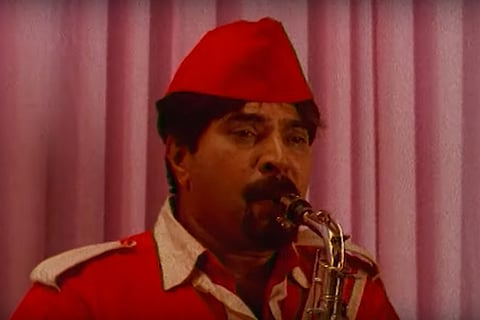

TV Chandran almost never lets Dany move away from his frame. Yet in the film that revolves around a lone, desolate man, and chronicles his life from youth to old age, it’s interesting how Dany has no character arc.
From Gandhi’s salt march to widow remarriage, from the formation of Kerala to the Babri Masjid demolition to Vajpayee’s reign – Chandran entwines Dany’s life with political milestones. Dany himself remains steadily isolated – in thought and action. The characters around him keep evolving, the framework keeps changing.
In many ways, he is one of the most wretched sights on celluloid; at no point in his life is he without near and dear ones and yet he is the aimless, lonely man who has no voice or identity.
Dry-witted Dany
It’s Dany’s (brilliantly nuanced act by Mammootty, one of his finest in fact) characterisation that really stands out in this film that at times struggles to keep our attention in place. Dany, the lad born in a fisherfolk village in Kochi, the man who masks his emotions behind an awkward smile, the greying old man who has learnt to show apathy to the world around him. His solitude has glimpses of what Sofia Coppola echoes through Bill Murray and Scarlett Johansson’s characters in Lost in Translation.
Chandran lathers Dany with a lot of dry wit. What makes it crackling is how organically and ingeniously it’s placed in the screenplay. Like the funeral song where he sings “Uncle died, aunty crying” with a straight face. Or when a grim moment of eavesdropping on another man propositioning his wife provokes an otherwise calm Dany to quietly knock the man down and then declare that it was “deliberate,” stressing on the vowels. Thereby nicely linking it to Dany’s previous English speaking classes.
Humour is finely wrapped in that scene where the nurse brings out Margaret’s baby and remarks on Dany’s resemblance, only to have another nurse showing up with the real baby. Dany’s response is a satirical coup – “Randinum entey chayayanu.”
Chandran also turns one of our oldest cinematic clichés on its head – Dany’s first love and heartbreak is interposed in a single scene, in the backdrop of his saxophone recital. The director is hilariously understated at the most unlikely of places – take that first night conversation with his first wife where Dany artlessly asks permission to touch her – “Nalla softu kayyanalla,” he says gently caressing her hands.
Margaret manipulates
She is introduced as someone who is mourning the death of her lover—but with time, her mask seems to be falling off, revealing a self-centred, heartless woman incapable of loving anyone.
In their marriage, she remains the man and Dany, the agonised, silent wife. From denying him conjugal rights to angrily refusing him permission to attend his daughter’s wedding, to his friendship with another woman, Margaret is a master manipulator.
All the world’s a stage?
Except for Dany, all the characters give the impression of being part of a play. Vani Vishwanath, despite greying hair, is unable to pull off the demeanour of an elderly woman. It’s evident that there is a younger woman behind that aged make-up. Mallika Sarabhai is another grave miscasting; neither is she convincing as an old woman nor is she able to let us invest in her character.
Dany’s reunion with his daughter Lucia could have been a bit more eloquent, unhurried and less theatrical. After all, there is a span of 40 years between them. A poignant moment gets lost in the scene and the dialogues.
Saxophone and solace
What is oddly heart wrenching about Dany is his nonchalance – even Freddy’s brimmed up eyes leaves him unemotional during the day of his wedding. Or maybe because we are not really let into his emotional space, scenes just keep moving meticulously, dispassionately passing over Dany’s various tragedies. The only instance we get his grief is when Lucia is taken away from him.
Dany’s identity is linked to the saxophone, in the red uniform of a band player. That’s the only instance he seems to be happy. There cannot be a better instance of his emotional detachment to the family than the scene where he plays the saxophone from the window as Margaret and her friends watch.
In the end, he finds comfort in the company of Bhargavi Amma. Dany’s bond with Bhargavi Amma had traces of the 1986 Rajesh Khanna-Smita Patil film Amrit – about an aged couple who find solace in each other after their respective children illtreat them. Dany similarly is drawn towards a compassionate voice – someone who really listens to him, who thinks he is a human being. Dany gets the dignity and respect he has always craved for, though briefly, and perhaps only in death – thanks to this stranger.
Chandran ruthlessly lets us introspect about the depth of relationships, the ones we often cling to for dear life, only to be thrown off balance without a backward glance. At various levels, Dany mirrors our inner fears. The fear and pain of being alone.
This article was originally published on Fullpicture.in. The News Minute has syndicated the content. You can read the original article here.